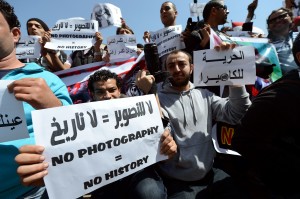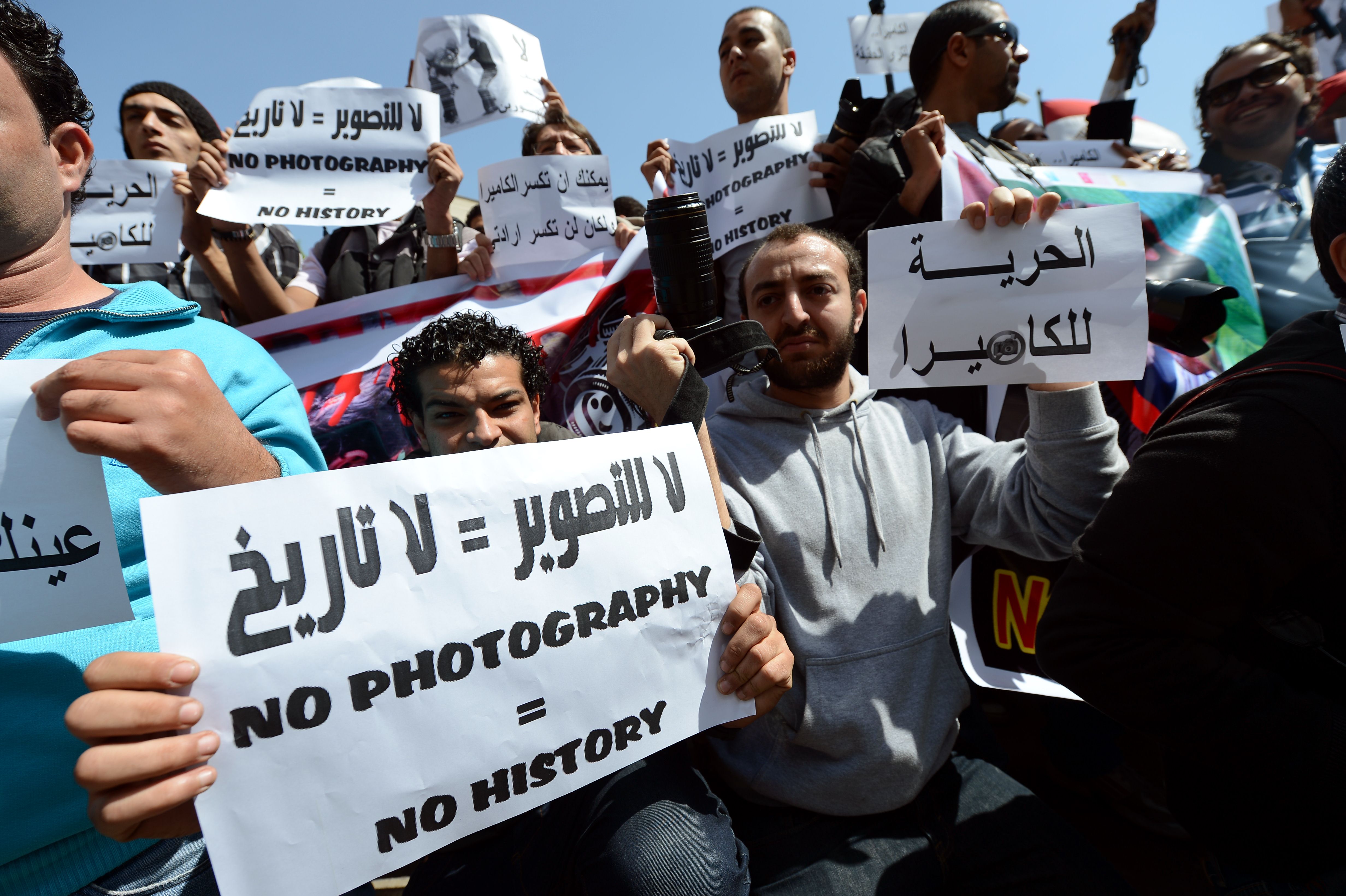
(AFP Photo)
Photojournalists protested in front of the Shura Council on Tuesday in reaction to increasing numbers of attacks against media workers in Egypt. The protest is supported by the Association for Freedom of Thought and Expression (AFTE), which launched a blog and began a Twitter campaign.
Nada Kabbary, the media spokesperson for AFTE, said the organisation would trend the hash tag “Support Journalists” in Arabic, allowing media professionals to share experiences and thoughts whilst raising awareness on the matter. “We have lawyers and researchers in the field who are writing up the regulations and laws which protect journalists,” Kabbary said, adding that this would help media professionals to be aware of their rights.
Kabbary explained that the participants have experienced varying degrees of interference in their work. “This is organised by the photojournalists who were present at clashes between the Central Security Forces and protesters on the Corniche and who have witnessed violations during clashes between the Muslim Brotherhood members and protesters outside of the Brotherhood headquarters in Moqattam,” she said.
Kabbary said AFTE is working on researching and documenting crimes committed against journalists in Egypt. “We will have press conferences in the coming period and we are preparing a report on the exact numbers of violations committed so far,” she said.
On Monday AFTE released a statement saying there have been nearly 20 cases of infringement on journalists’ rights over the past week. Infringements ranged from verbal abuse to arbitrary detention and destruction of equipment.
AFTE said it had noticed an evolution in the methods used by security forces to deal with journalists. “Before security forces sometimes targeted cameras without necessarily targeting the bearer, but now it has developed to a point where security personnel actively look for journalists and target them in a brutal and systematic way which may at times lead to serious injuries,” AFTE said. AFTE claimed these methods are an attempt to stop the media covering events where security forces plan to use violence, making it harder to prosecute them for using excessive force.
AFTE also said attacking journalists would not stop information from getting to people due to social networking culture, which allows for instantaneous transference of information. AFTE demanded an investigation be launched into the conduct of Muslim Brotherhood members involved in the Moqattam clashes after they attacked four journalists.
Given the recent spate of attacks against journalists covering demonstrations, several Non-Governmental Organisations have condemned the excessive use of force against media personnel.
On Tuesday the New World Foundation for Development and Human Rights called on the Press Syndicate and civil society organisations to “address international organisations on freedom of the press and freedom of expression and show solidarity with Egyptian journalists” who have come under attack for their work.
The foundation called attacks on journalists covering the protest outside the Brotherhood headquarters “an outrage,” unacceptable, and a violation of citizen’s rights to public opinion and access to information.
The foundation suggested journalists wear badges allowing them to be identified and protected by security. The foundation argues visible identification would make it harder for people to attack journalists under the pretext that it is difficult to identify media workers during protests and clashes.
In order to combat the phenomenon, the foundation says the Press Syndicate and civil society organisations should bring the issue to the High Commissioner of the United Nations for Human Rights, Navi Pillay, as well as the International Committee to Protect Journalists and Reporters Without Borders.
On Monday the Arab Foundation for the Support of Civil Society and Human Rights also condemned the Moqattam attacks on journalists and protesters.
A lawyer and executive director of the foundation, Sharif Hilali, said these attacks are targeting journalists’ right to cover protests and violate their rights as citizens.
On Sunday the National Committee for Defending Freedom of Expression (NCDFE) held a press conference denouncing attacks on the press, calling on local and international organisations to show solidarity for journalists. NCDFE’s committee spokesperson Yehia Qallash called for a sit-in to take place at the Press Syndicate on Wednesday.


